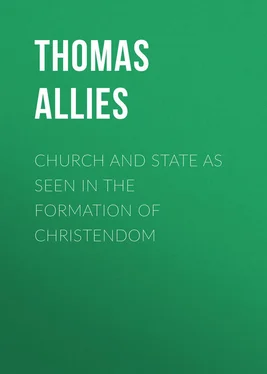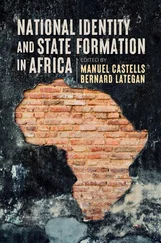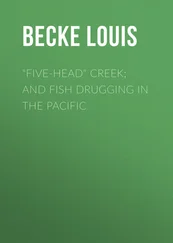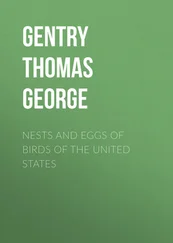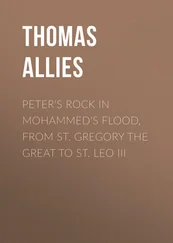Thomas Allies - Church and State as Seen in the Formation of Christendom
Здесь есть возможность читать онлайн «Thomas Allies - Church and State as Seen in the Formation of Christendom» — ознакомительный отрывок электронной книги совершенно бесплатно, а после прочтения отрывка купить полную версию. В некоторых случаях можно слушать аудио, скачать через торрент в формате fb2 и присутствует краткое содержание. ISBN: , Жанр: foreign_antique, foreign_prose, Историческая проза, на английском языке. Описание произведения, (предисловие) а так же отзывы посетителей доступны на портале библиотеки ЛибКат.
- Название:Church and State as Seen in the Formation of Christendom
- Автор:
- Жанр:
- Год:неизвестен
- ISBN:http://www.gutenberg.org/ebooks/38537
- Рейтинг книги:4 / 5. Голосов: 1
-
Избранное:Добавить в избранное
- Отзывы:
-
Ваша оценка:
- 80
- 1
- 2
- 3
- 4
- 5
Church and State as Seen in the Formation of Christendom: краткое содержание, описание и аннотация
Предлагаем к чтению аннотацию, описание, краткое содержание или предисловие (зависит от того, что написал сам автор книги «Church and State as Seen in the Formation of Christendom»). Если вы не нашли необходимую информацию о книге — напишите в комментариях, мы постараемся отыскать её.
Church and State as Seen in the Formation of Christendom — читать онлайн ознакомительный отрывок
Ниже представлен текст книги, разбитый по страницам. Система сохранения места последней прочитанной страницы, позволяет с удобством читать онлайн бесплатно книгу «Church and State as Seen in the Formation of Christendom», без необходимости каждый раз заново искать на чём Вы остановились. Поставьте закладку, и сможете в любой момент перейти на страницу, на которой закончили чтение.
Интервал:
Закладка:
February 12, 1882.
CHAPTER I
In one of the most ancient books of the world, which, in addition to its antiquity, all Christians venerate as containing the original tradition of man’s creation, guaranteed in purity and accuracy by divine assistance given to the writer, we read the following words: – “God made the beasts of the earth according to their kinds, and cattle, and everything that creepeth on the earth after its kind. And God saw that it was good. And he said: Let us make man to our image and likeness: and let him have dominion over the fishes of the sea, and the fowls of the air, and the beasts, and the whole earth, and every creeping creature that moveth upon the earth. And God created man to his own image: to the image of God he created him: male and female he created them.” And further: “The Lord God formed man of the slime of the earth; and breathed into his face the breath of life, and man became a living soul… And the Lord God took man and put him into the paradise of pleasure, to dress it and to keep it. And he commanded him, saying, Of every tree of paradise thou shalt eat; but of the tree of knowledge of good and evil thou shalt not eat. For in what day soever thou shalt eat of it, thou shalt die the death. And the Lord God said, It is not good for man to be alone; let us make him a help like unto himself. And the Lord God having formed out of the ground all the beasts of the earth, and all the fowls of the air, brought them to Adam to see what he would call them: for whatsoever Adam called any living creature, the same is its name. And Adam called all the beasts by their names, and all the fowls of the air, and all the cattle of the field; but for Adam there was not found a helper like himself. Then the Lord God cast a deep sleep upon Adam: and when he was fast asleep he took one of his ribs and filled up flesh for it. And the Lord God built the rib which he took from Adam into a woman: and brought her to Adam. And Adam said, This is now bone of my bones, and flesh of my flesh: she shall be called Woman, because she was taken out of man. Wherefore a man shall leave father and mother, and shall cleave to his wife: and they shall be two in one flesh. And they were both naked, Adam and his wife, and were not ashamed.”
Such is the account of the origin of man, of woman, of marriage, as the root of human society, and of that society itself, beginning in the absolute unity of one who was father and head of his race, created in full possession of reason and language, and exercising both by an intuitive knowledge of the qualities of living creatures as they are brought before him by his Maker. This account stands at the head of human history, and has been venerated as truth by more than a hundred generations of men since it was written down by Moses, not to speak of those many generations among whom it had been a living tradition before he had written it down. Human language scarcely possesses elsewhere such an assemblage of important truths in so few words. Perhaps the only parallel to it is contained in the fourteen verses which stand at the opening of St. John’s Gospel, wherein are recorded the Godhead and Incarnation of the Divine Word. The first creation has its counterpart only in the second; and the restoration of man by the personal action of God alone surpasses, or, perhaps, more truly may be said to complete, the Idea of his original formation by the same personal action of the same Divine Word, who, great as He is in creating, is yet greater in redeeming, but is one in both, and in both carries out one Idea.
For the creation of man as one individual, who is likewise the head and bearer of a race, is the key to all the divine government of the world. The fact rules its destinies through all their evolution. The world, as it concerns the actions, the lot, and the reciprocal effect of men upon each other, would have been quite a different world if it had not sprung out of this unity. If, for instance, mankind had been a collection of human beings in all things like to what they now are, except in one point, that they were independent of each other and unconnected in their origin. This unity further makes the race capable of that divine restoration which from the beginning was intended, and with a view to which man was made a race: which in restoring man likewise unspeakably exalts him, for He who made Adam the father and head of the race, made him also “the figure of One that was to come.”
Let us briefly enumerate the parts of the divine plan as disclosed to us in the narration just given.
In the council held by the Blessed Trinity it is said, “Let us make man to our image and likeness;” not, Let us make men, but man: the singular number used of the whole work indicates that the creation to be made was not only an individual but a family. From the beginning the family is an essential part of the plan. This is no less indicated in the single creation of Adam first, not the simultaneous creation of the male and female, as in the case of all other creatures, but the creation by himself of the head alone, from whom first woman by herself, and then from the conjunction of the two his family is drawn. In Adam first, while as yet he is alone, the high gifts of reason, speech, and knowledge indicated in the twofold and also congenital possession of reason and language, are exhibited as residing as in a fountain-head, when all creatures of the earth and the air are brought before him by his Maker, and he with intuitive understanding of their several qualities and uses imposes on them the corresponding name. Thus Adam is created complete, a full-grown man, in whom the divine gift of thought finds expression in the equally divine gift of language, both exerted with unerring truth, for it is intimated that the names which he assigns to the creatures thus passed in review render accurately their several natures. It is not said that the Lord God intimated to Adam the names which he should give; but the knowledge by which he gave the names was part of his original endowment, like the gift of thought and language, which answer to each other and imply each other, and in a being composed of soul and body complete by their union and joint exercise the intellectual nature. “The Lord God brought all beasts and all fowls before Adam to see what he would call them; for whatsoever Adam called any living creature, the same is its name.”
This presentation of the creatures before Adam, and their naming by him, is the token of the dominion promised to him “over the fishes of the sea, and the fowls of the air, and the beasts, and the whole earth,” as the result of his being made to “the image and likeness” of the Triune God. Only when he has thus taken possession of his royalty is the creation of the family completed out of himself. For when “for Adam there was not found a helper like himself,” the Lord God took not again of the slime of the earth to mould a woman and bring her to man, but “He cast a deep sleep upon Adam, and built the rib which He took from Adam into a woman, and brought her to Adam.” And then He uttered the blessing which should fill the earth with the progeny of the woman who had been drawn from the man her head, saying, “Increase and multiply and fill the earth, and subdue it, and rule over the fishes of the sea, and the fowls of the air, and all living creatures that move upon the earth.”
What, then, is the image and likeness of the Triune God? The image consists in the soul, with its two powers of the understanding and the will, proceeding out of it, indivisible from it, yet distinct. May we not infer that the likeness is the obedience of the soul, with its powers, to the eternal law? This law, viewed in the Triune God, the prototype of man’s being, is the sanctity of the Divine Nature; but in man, thus created, the obedience to it was the gift of original justice superadded to his proper nature: the gift by which the soul, in the free exercise of the understanding and the will, was obedient to the law of God, its Creator.
Читать дальшеИнтервал:
Закладка:
Похожие книги на «Church and State as Seen in the Formation of Christendom»
Представляем Вашему вниманию похожие книги на «Church and State as Seen in the Formation of Christendom» списком для выбора. Мы отобрали схожую по названию и смыслу литературу в надежде предоставить читателям больше вариантов отыскать новые, интересные, ещё непрочитанные произведения.
Обсуждение, отзывы о книге «Church and State as Seen in the Formation of Christendom» и просто собственные мнения читателей. Оставьте ваши комментарии, напишите, что Вы думаете о произведении, его смысле или главных героях. Укажите что конкретно понравилось, а что нет, и почему Вы так считаете.
